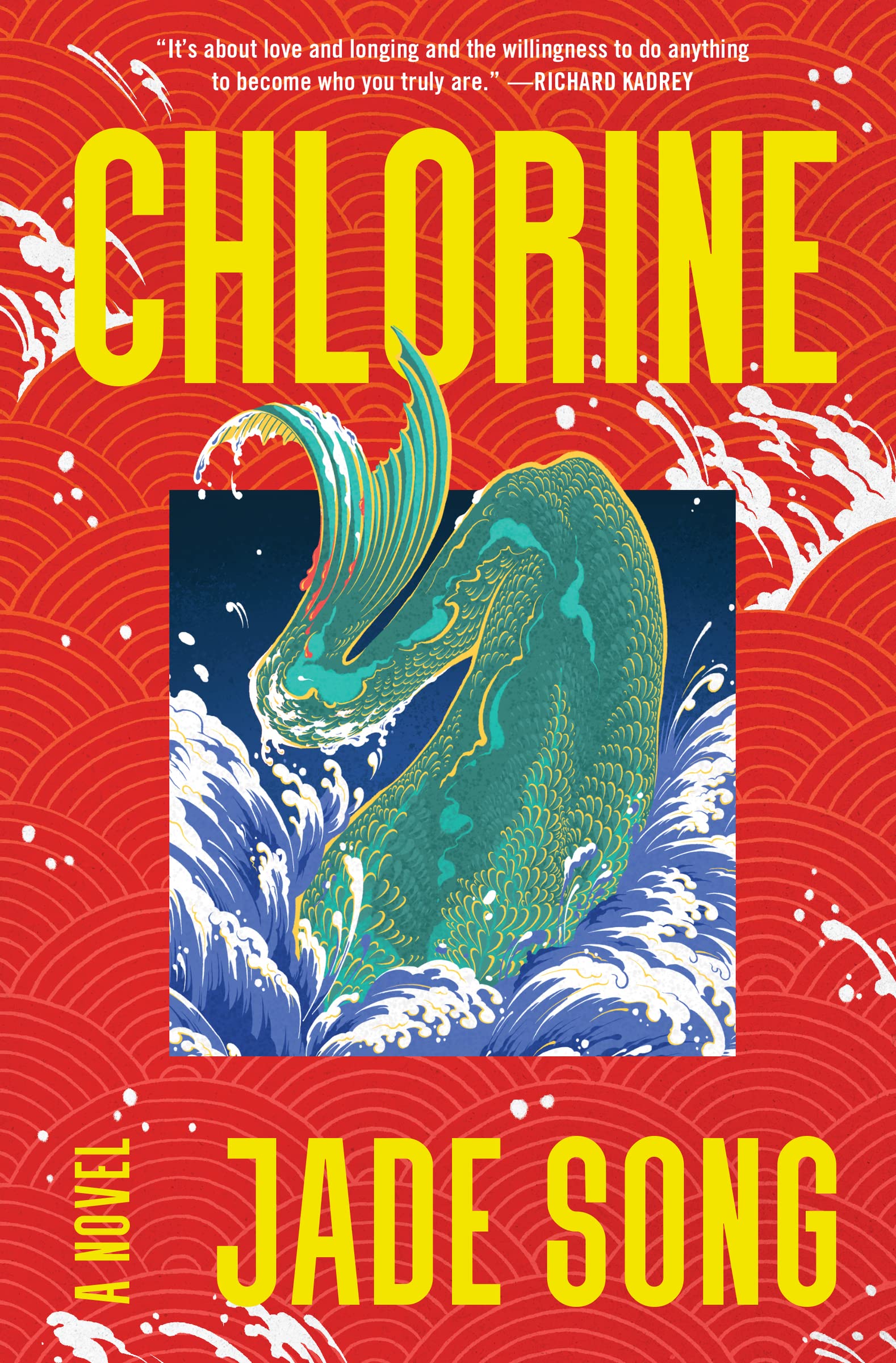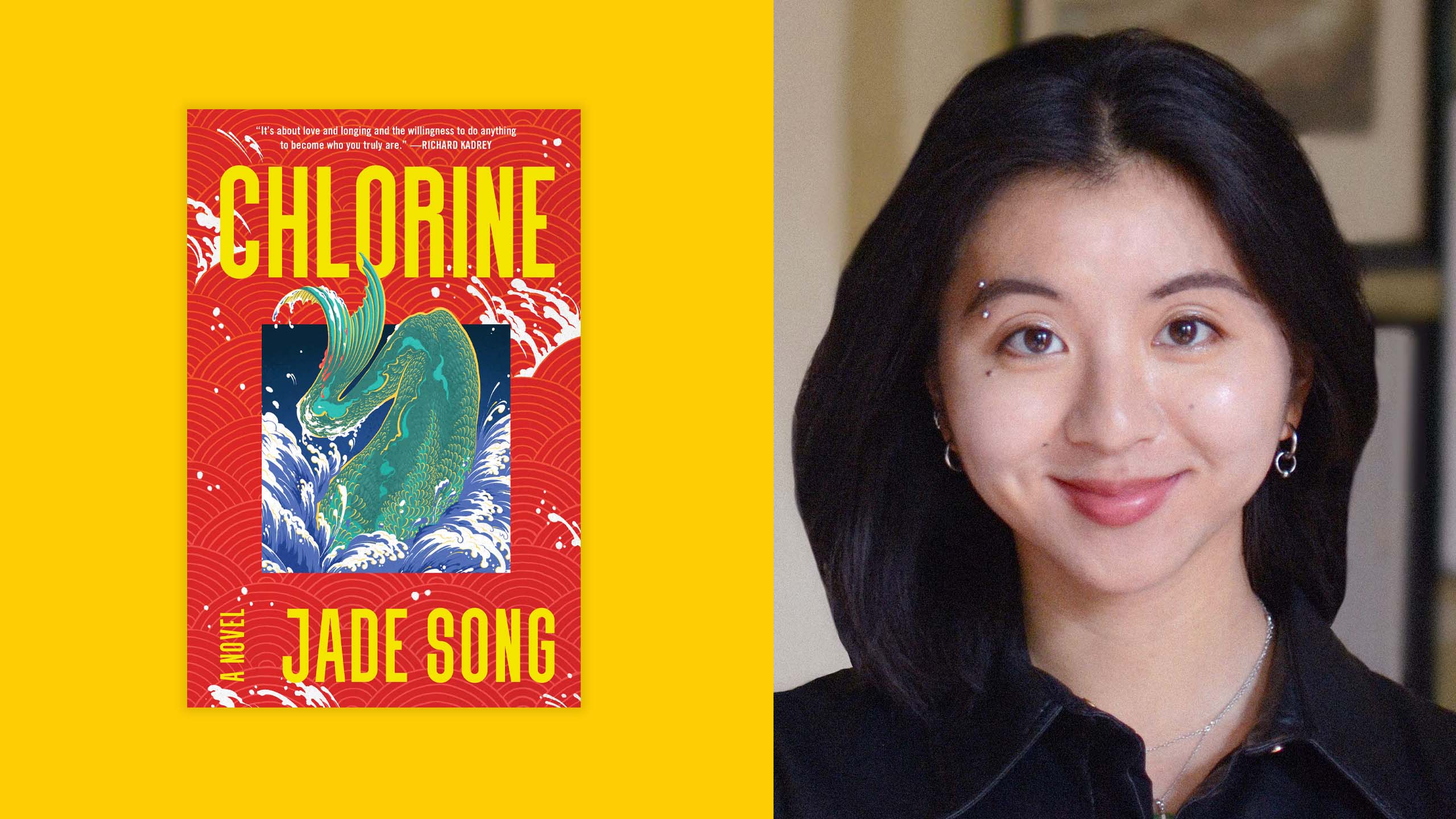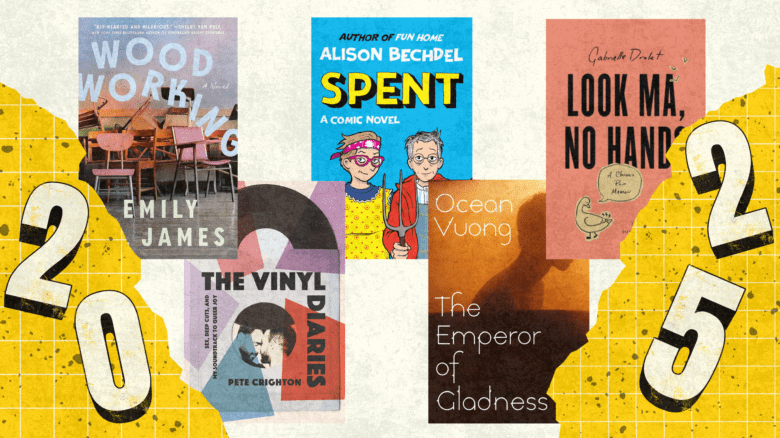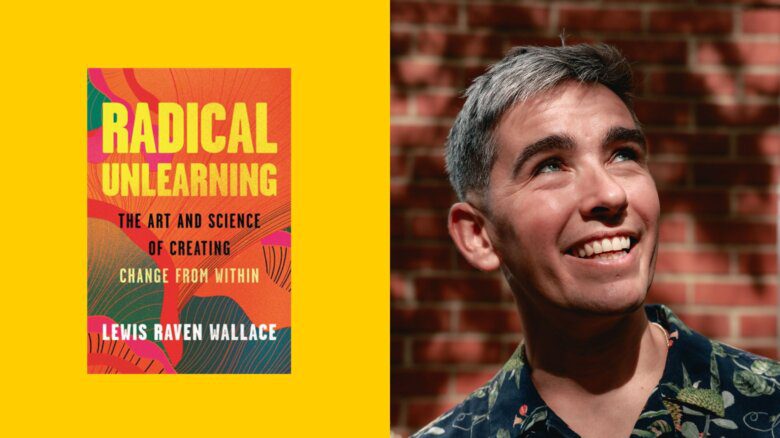As a former high school swimmer, I’ve always been drawn to stories that are set in the pungent turquoise depths of regulation-length pools. There is something both dreadful and compelling about being thrust back into the days of early-morning practices, timed heats, dry skin, chlorine-scented sweat and hair, and permanent raccoon-like goggle marks. If the story is also queer, so much the better. I devoured Alexander Chee’s gorgeous, propulsive novel, Edinburgh—the story of a young Korean-American queer boy who survives childhood sexual abuse, and has to come to terms with the lingering trauma while working as a high-school swim coach in adulthood. I was introduced to Céline Sciamma’s films via La naissance des pieuvres, a tale of queer longing, teen power dynamics and synchronized swimming. I found companionship in Anelise Chen’s So Many Olympic Exertions, a ruminative novel about sports, writing and failure. It isn’t overtly queer, but there is a queerness in its contention with what happens outside and beside commonly acknowledged forms of success, wide of the goalposts of “normative time.” I treasured Sara Jaffe’s Dryland, set in the early 1990s in Portland, a lesbian coming-of-age story whose idiosyncratic protagonist joins the swim team to pursue a crush, despite some dark swimming-related family history. Like Chen’s novel, Dryland also dwells in failure—Julie, its protagonist, is on the swim team, but she isn’t by any measure a fast swimmer, nor has she “figured out” her queerness, as so many of us did not or could not in adolescence.

Jade Song’s debut novel, Chlorine, is an uneven but ambitious contribution to queer swimming fiction. Though not marketed as YA, it explores themes of adolescent identity formation and failure, from within the chemical waters of the high school pool. Its protagonist is one of the star swimmers on her team, idolized and crushed on by another swimmer—failure in this story doesn’t so much happen in the pool as it does in the everyday struggle to exist outside the water. Ren Yu is a competitive swimmer at her high school in Pittsburgh; we quickly learn that she hates her fellow humans and is intent on becoming a mermaid—not the pretty Disneyfied kind, but one of the vicious types who lure men to their deaths. “For too long you’ve been inundated by G-rated fairy tales,” Ren tells us, “the blood and dirt in their original drafts scrubbed clean by salarymen in suits.” The narrator is a future Ren, who claims to be a mermaid. She tells us the painful story of what led to her defection from humankind—which her family, peers and her closest friend Cathy seem to have experienced as her disappearance–or possibly her death.
Chlorine’s dust jacket copy led me to expect queer campiness; the combination of high-level competitive athletes, lesbian longing and mythological transformation sounds like a recipe for humour and absurdism on a grand scale. But instead, the novel is earnest, and staunchly set in the recognizable world. It doesn’t inhabit the fantastical realm so much as the realm of physically and psychologically induced stress. Though Ren sacrifices everything in her bid to become a mythical creature, her transformation bears the bloody limitations of the material world, rather than transporting her and the reader into the supernatural. This is a sometimes-unfocused novel that takes a while to get going, although it does impress with its dedication to subverting the tropes of coming-of-age stories, adolescent queer romance stories and high-achieving-Asian-daughter stories. Chlorine has its share of dread, as I had hoped, but didn’t manage to fully compel me until its last few chapters. To their credit, Song delivers an unsettling and ambiguous ending that is worth arriving at, if you can bear to stick with its prickly narrator all the way through.
The rituals and terrors of the pool anchor the novel’s action. Jade Song, a writer and art director living in Brooklyn, was a competitive swimmer for 12 years, and it shows; they write with convincing and painful detail of the exhausting practices, the stress and thrill of swim meets and the strict expectations around everything from body weight to “dropping time”—swimmer talk for swimming faster than your previous best.
“To win was euphoria, and euphoria was a blackout—black holes, stars and galaxies forming at the edge of your goggles, an entire outer space dedicated to the Big Orgasmic Banging of first place.”
Song captures the way that a sports team can become a social world unto itself. We don’t know anything about Ren’s classmates at school, with whom she presumably spends most of her days —we only know her teammates, particularly Cathy, with whom she has a crush-fuelled friendship, and Jim, her bullish, inappropriate coach. Ren, who feels her outsider status as the only Asian kid at swim tryouts, whose mother dresses her in an embarrassing swimsuit with a tutu attached, turns out to be a gifted swimmer. “They had proper gear,” she says of the other hopefuls, “but I had confidence. I had yearning.”
Portentously, her parents named her Ren Yu 人魚, which translates to “person fish” or “mermaid.” Ren’s mother invented this name for her daughter, “symbolic of the way her first and second language deteriorated from immigration, creating a new language with threads from both.” It isn’t clear to me how this invented name takes threads from English, but the idea of Ren having been destined to swim, and also possibly destined for her obsession with mermaid-hood due to her name is interesting enough. Driven by her own ambition, rather than any particular pressure from her parents, Ren’s love for swimming, and for winning, quickly eclipses all other considerations in her life: “To win was euphoria, and euphoria was a blackout—black holes, stars and galaxies forming at the edge of your goggles, an entire outer space dedicated to the Big Orgasmic Banging of first place.” She swims butterfly, of course, the hardest stroke to master. The sense of belonging that she can’t attain on land, where she remains on the fringes of the swim team’s social circle, comes to her easily in the water: “I was alone in the pool the first time I dove in, and I’ve sought the same sense of isolated grandeur ever since.” At one point in the narrative, forced to take a swimming break due to a concussion, Ren laments: “What was my life worth if I couldn’t stay in the pool?”
The majority of Chlorine takes us through Ren’s life as a swimmer—from practices to swim meets to “pasta parties” where the team feasts on carbs before competitions. Aside from swimming and winning, her main drive is to divorce herself from humanity. The grandeur she experiences in the pool translates to a profound disdain for “you poor humans,” as she puts it, when she’s on dry land. We spend the book waiting for her transformation into mermaid to occur, and for there to be mounting motivations for it. One of the barriers to understanding Ren’s motivations is that she is an emotionally closed-off character, and thus a narrator who has difficulty connecting with the reader. In fact, she’s actively hostile toward us. “You think mermaids hate their bodies and their tails, though these are the parts of them that hold their power,” she accuses early on. Ren is willing to maim herself to become a mermaid, to become non-human. Despite harbouring a romantic curiosity toward her teammate Cathy, who is clearly in love with her, she treats Cathy as a subordinate most of the time, because nothing and nobody can match the importance of swimming. There isn’t much romantic tension between them, because Ren is so invested in her own superiority vis-à-vis humans of any kind.
It can be hard to understand where Ren’s obsession with defecting from humanity comes from, not because Ren doesn’t experience traumas, but because the book doesn’t slow down to sit with her difficulties. Even though she is the narrator, we don’t get much information about how Ren feels about various events in her life, including the inappropriate behaviour of her coach, and an assault by a male teammate. She doesn’t seem to react internally, or externally. “Mermaids do not trouble themselves with the petty troubles of their human past,” she explains. Fair enough! But this attitude makes her a difficult narrator to connect with. If she doesn’t care about her human past, it can be tough for the reader to do so. I found myself wishing for some showdowns—to push the story forward, to reveal repressed emotions, to clarify various characters’ dynamics. There is no major conflict between Ren and her parents, between Ren and Cathy, not even between Ren and her abusive coach, Jim. Without overt conflict, and with the non-human Ren narrating emotionlessly from the future, there isn’t always enough fodder to push the plot forward. We are told that Coach Jim is handsy and inappropriate with Ren: “He loved to touch me. Never where it would count as illegal, as abuse. None of his touches would compel you to stop reading in disgust.” His introduction is ominous, but as the book goes on, he fades in and out. We are told that he sends Ren inappropriate texts, though we don’t know what they say, and she doesn’t discuss them with anyone, including the reader. Sometimes he hits swimmers over the head with flutter boards or throws pool chairs in anger, but these moments are narrated in passing, so that we get a vague overview of him as a tyrant, but aren’t able to feel the impacts of his tyranny.
“What is it called when immigrants reverse, when they wake up from the nightmare masked as a dream?”
At home, Ren’s mother is a refreshing departure from the stereotypical figure of the strict Chinese parent: she is largely supportive of Ren’s swimming, after some initial qualms about how much Ren adores the sport. But she isn’t a particularly strong presence in the book, although there are some rare sweet scenes in which she and Ren watch Wong Kar Wai’s Chungking Express (one of my favourite movies, incidentally) over and over, and sing along to Faye Wong. Ren’s father is mainly absent—he lives separated from his family, working abroad in China. This absence is rarely mentioned; if it’s meant to be a catalyst for Ren’s hatred of humankind, this is not adequately conveyed. “What is it called when immigrants reverse, when they wake up from the nightmare masked as a dream?” Ren asks early on. This is a compelling question, but one that is neither answered nor revisited in the narrative; it isn’t clear whether Ren’s transformation is linked to feeling “othered” by her white peers, or to any particular diasporic angst.
The text itself is sometimes weighed down by confused syntax—at points, Song seems intent on using as many words as possible to convey images or ideas that could have been put more succinctly. Referring to herself and Cathy, Ren says: “Though we were young, we had duplicate facial characteristics indicating how we relinquished rest for swim practice.” Describing her dynamic with creepy Coach Jim, Ren says, “Jim offered me training to secure these victories, and so I bestowed unto him my love in return.” The elevated diction of “bestowed unto him my love” feels odd and out of place within the normal tone of the text, which is straightforward contemporary English. If it were a mode of speech that Ren used often to indicate irony or humour, it could work, but since this isn’t the case, it lands awkwardly. Certain descriptions don’t totally make sense; for instance, when Ren starts sleeping with a boy on the team whom she doesn’t like and isn’t attracted to, she likens him to “a raw cup of broccoli if I was starving” but then describes the time they spend hooking up as “months of bliss” without much explanation. During a tense game of truth or dare, Cathy looks “intrigued and bored”—two emotions that are at odds with one another and are hard to imagine existing in tandem on a person’s face.
The saving grace of Chlorine is the relationship between Ren and Cathy: Cathy is the only character whom we hear from other than Ren, and one of the few characters to convey genuine emotion. Unlike the callow boys on the team, or the envious girls, Cathy is kind to Ren, keen to connect with and support her. There is an undeniable intimacy to their friendship: Cathy helps Ren shave her body hair, a pre-race ritual. She even assists her in inserting her first tampon in a bathroom stall at a meet. Song smartly incorporates Cathy’s voice via letters she writes to Ren, after Ren’s disappearance. She entreats Ren, who is now apparently a mermaid, to come back; she confesses the full extent of her longing for Ren, and she reminds Ren of various pivotal moments in their shared lives. Cathy, who has empathy for Ren that Ren doesn’t seem to have for herself or anyone else, helps to soften our view of a narrator who is often so derisive that she is hard to stay in tune with. It’s worth noting that Cathy is white and more normative within their homogenous world, but that she is the one who yearns for Ren’s attention, not the other way around. There are so many stories about Chinese or other racialized characters who idolize their white peers and want so badly to be like them; it’s refreshing to read about Ren, who is different and knows it and doesn’t try to fit in at all; who sees herself as special and superior, rather than assimilating, even though this superiority leads to horrifying choices. We feel the impact of their relationship in a heartbreaking scene late in the novel because Ren allows herself to be present with Cathy, if only briefly. As I read this section, I said out loud, “If only there had been more of this!”
Chlorine is an uneven debut, but there is enough ambition here and a unique vision, a commitment to the ugly and the uncomfortable that I admire, something that can be lacking from stories about racialized characters, especially teens, who are often expected to be “relatable” to a wide array of audiences. I can appreciate Ren for how abrasive she is, how she resists comforting story arcs of forgiveness and redemption in favour of something more painful and risky. Transformation, whether supernatural or not, is often riddled with loss and difficulty, and Jade Song boldly refuses to let us forget that.


 Why you can trust Xtra
Why you can trust Xtra


